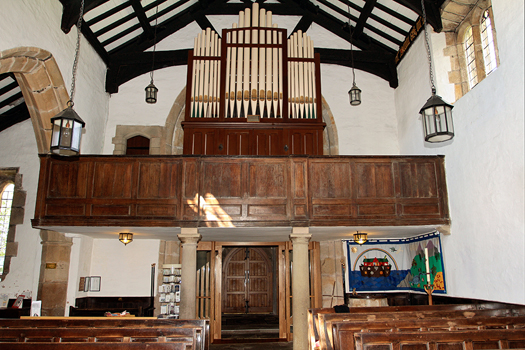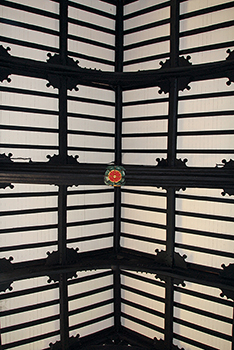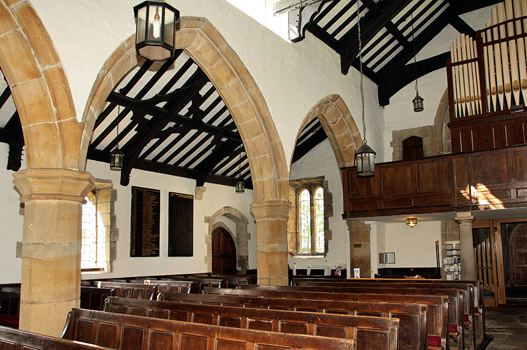 |
| St. Wilfrid's, Ribchester |
 |
| St. Wilfrid's, Ribchester |
Ribchester lies on the River Ribble between Blackburn and Preston and was the site of a Roman fort known as Bremetennacum. There are many Roman remains in the area and some are displayed in the museum. There is also an excavation of a bath house. One of the most spectacular finds was a Roman cavalry helmet, part of the Ribchester hoard, found in 1796 near the river bank. It is now in the British Museum.
For the purpose of this page I focus entirely on the church of St. Wilfrid, on the outskirts of the village in what is believed to have been the centre of the Roman Fort. It is said to have been founded by St. Wilfrid in the 8th century but the current building dates from the 13th century with a chapel and porch added in the 14th century and the tower in the late 15th century. The rather unusual windows in the roof date from 16th century when the height was increased. There is a west gallery dating from 1736. In 1881 there was a restoration that included rebuilding the north wall of the chancel. Everywhere inside there are fascinating features of church architecture, some of which I show below. I was fortunate to visit as a member of a study group on Lancashire Churches led by David Brazendale from the nearby Alston Hall College. A measure of the importance of this church is that it was given Grade I listed status by English Heritage in 1966.
 |
 |
|
| West Gallery has Tuscan columns | Nave ceiling | |
 |
 |
|
| South Arcade | Chancel Arch | |
 |
 |
|
| Box pews | Jacobean style pulpit from c. 1636 | |
 |
 |
|
| The Chancel and East Window | The font, possibly 14th century | |
 |
 |
|
| South side of the chancel | Church entrance with columns | |
 |
 |
|
| Hoghton Quire | Wall painting of St. Christopher |
Arthur Mee writes that the earliest known rector of Ribchester, Drogo, was drowned in 1246 while fording the river. He mentions that in the porch there is seat carved with the arms of the Hoghtons of Hoghton Tower. On the south side of the nave is the Hoghton Chapel or Quire. The Tuscan columns supporting the West Gallery are believed to be Roman and therefore among the oldest features of any church in England. Similar columns are found in the village supporting the porch of the White Bear Inn. The 14th century Dutton Chapel, opening from the north aisle, has a wall painting of St. Christopher. One of the roof beams of the nave bears the date 1527.
Church site for St. Wilfrid's.
The King's England, Lancashire, by Arthur Mee, Hodder and Stoughton, London, 1936, 5th impression, 1960.